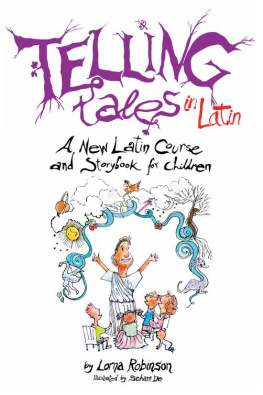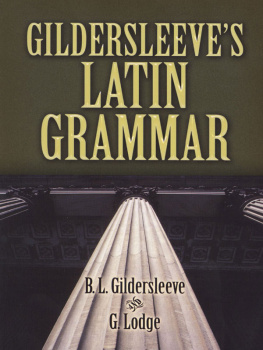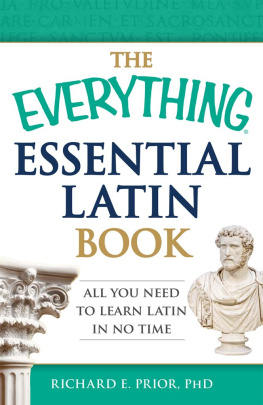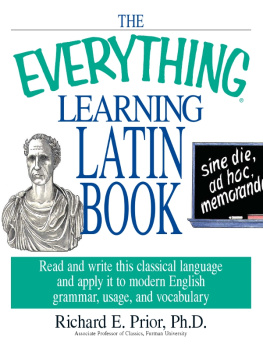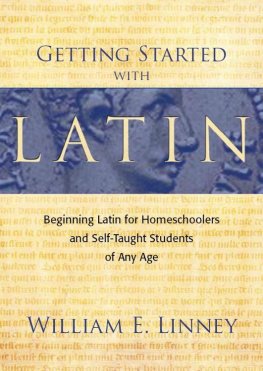CONTENTS
PART ONE
INTRODUCTORY
PART TWO
FINAL PRELIMINARIES
PART THREE
INTO BATTLE
ABOUT THE BOOK
This very special little book contains everything you need to learn Latin.
Whatever your age or ability, Mr Gwynne will guide you through this most important language teaching you Latin efficiently and rapidly.
He also pays special attention to the Latin words that we already use every day, how to use them correctly and what they really mean.
Mr Gwynne strongly believes that being good at Latin will improve your English and also make you better at everything else. And Mr Gwynne is never wrong.
ABOUT THE AUTHOR
Formerly a successful businessman, N. M. Gwynne has for many years been teaching just about every sort of subject to just about every sort of pupil in just about every sort of circumstance English, Latin, Greek, French, German, mathematics, history, classical philosophy, natural medicine, the elements of music and How to start up and run your own business in lecture-halls, large classrooms, small classrooms and homes to pupils aged from three years old to over seventy of many different nationalities and in several different countries and since 2007 face to face over the Internet.
His teaching methods are very much in accordance with the traditional, common-sense ones, refined over the centuries, that were used almost everywhere until they were abolished worldwide in the 1960s and subsequently. His teaching has been considered sufficiently remarkable both in its unusualness in todays world and in its genuinely speedy effectiveness to have featured in newspaper and magazine articles and on television and radio programmes.
To the pupils, of all ages from youngest to oldest, to whom I have taught Latin in many parts of the world, and especially to those whose difficulties in learning Latin have contributed significantly to what is in this book.
PREFACE
WHAT CAN YOU reasonably hope to have achieved by the time you come to the end of this small volume, assuming that you use it throughout as I urge you to?
One answer is: you could know about as much Latin as a reasonably intelligent eleven- or twelve-year-old would have known in the days when I was at school. To know as much as that would have been the result of a considerable amount of exposure to Latin for instance, at one of the best-known preparatory schools there were ninety minutes a day six days a week of Latin lessons during the eight months per annum of school time.
Another answer is: many times more Latin than will be known, in almost all cases, by highly intelligent scholars of today who have passed all their Latin exams and are studying Classics at any of the top universities in Britain.
A third answer, carrying the advantage of not varying according to time and circumstance, is that you will be in a position, with some help from a dictionary, to embark with pleasure on some of the greatest and in every way most remarkable works of literature ever written, starting with the traditional first Classical text for schoolboys, Julius Caesars Gallic Wars. What that means is that those who use this book as methodically as I recommend will have learnt a very large amount of Latin, including all the most important grammar word forms and sentence constructions and plenty of vocabulary and much else.
One last answer under this heading is that you cannot fail to have improved radically and I really do mean from the roots upwards your grasp and mastery of English, for a number of reasons.
One is the point made by all promoters of Latin, and by me in English vocabulary, and to know the source of any word is to understand it better. For instance, radically, just used in the last sentence, comes from the Latin word radix meaning root.
A second is that translating English into Latin always requires one to reorganise in ones mind, sometimes very greatly, the English sentence being translated, in order to put it into a form which will work in Latin; and this cannot be done without a clear understanding of how the English sentence was put together.
A third reason is that, when translating from Latin into English, one must first do a translation that merely makes sense, and sometimes only just, and then revise it thoroughly into what reads well in English.
Surely not to be ignored is that the English language includes hundreds of words and idioms which are in untranslated Latin. By the end of this book you will be able to translate them, in most cases effortlessly, and this will make their meaning very much clearer than if you were to rely solely on what a dictionary says as to their meaning. This book indeed devotes exercises to the practice of dealing with everyday LatinEnglish, from affidavit to e.g. to status quo to vice versa and vox populi, and you cannot fail to find this a useful feature.
IT IS NOW worth making mention of what I believe to be the single gap in what this book has to offer you if used in isolation.
In one respect, this book is complete as far as it goes. It includes all the information needed in order to learn Latin up to a much more advanced level than, as just mentioned, ordinary students specialising in Classics will have reached by the time they have arrived at any of the leading universities.
In another respect, however, the book is incomplete. Nor could it be otherwise, other than at about three times its present length.
The reason is this.
If you use this book as I recommend, you can acquire a knowledge of Latin vocabulary and grammar that is so extensive that plucking out of your memory the words you want and declining or conjugating them is effortless and enjoyable. You can also gain a clear understanding of how to use them.
That, however, is far from the same as being able to use them accurately and reliably in sentences, whether translating from English into Latin or from Latin into English. For that you need practice, and much of it. Every single syntactical construction you learn must be practised and practised and practised until putting clauses and sentences together is, at least at this stage of reasonably elementary Latin, so easy as to be all but instinctive, virtually like a reflex action. You need to be able to see at a glance, without having to puzzle it out, that the Latin for The good slaves love their countrys Queen is Servi boni patriae reginam amant, and vice versa if translating from Latin into English.
In this book you will find enough exercises to help you understand the various constructions and words, but not for the extensive practice needed for them to become part of you, which, as I say, is beyond the reach of a book of this convenient size. For that purpose, therefore, a website has been set up, where you will find as much practice material as you could need for developing a real mastery of what this book covers, and to give you the confidence that you are on top of the subject.
IT IS PERHAPS worth highlighting here that I believe there to be two chapters in this book that include much material which, although important, will not be found in any other Latin textbook written within the living memory of even the oldest of us, at least in the thoroughness that it is given here. These are the chapters (a) on the techniques and skills of translating Latin into English, and (b) on Latin word order and how variations in word order can dramatically change the meaning of clauses and sentences.



